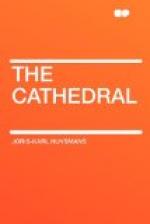Durtal, as he turned the pages, came on such lamentable and humble prayers as these: “Thou who hast shapened me in my mother’s womb, let me not perish.... Lord, I confess my poverty.... My conscience gnaws me and shows me the secrets of my heart. Avarice constrains me, concupiscence befouls me, gluttony disgraces me, anger torments me, inconstancy crushes me, indolence oppresses me, hypocrisy beguiles me.... and these, Lord, are the companions with whom I have spent my youth, these are the friends I have known, these are the masters I have served.” And further on he exclaims, “Sin have I heaped upon sin, and the sins which I could not commit in very deed yet have I committed by evil desire.”
Durtal closed the volume, regretting that it should be so entirely unknown to Catholics. They were all busy chewing the cud of the old hay left at the heading or end of the “Christian’s Day” or “The Eucologia,” or meditating on the pompous prayers elaborated in the ponderous phraseology of the seventeenth century, in which there is no accent of sincerity to be found—nothing, not an appeal that comes from the heart, not even a pious cry!
How far were these rhapsodies all cast in the same mould from this penitent and simple language, from this easy and candid communion of the soul with God?
Then Durtal dipped again here and there, and read:—
“My God and my Mercy, I am ashamed to pray to Thee for very shame of my evil conscience; give a fountain of tears to my eyes, and my hands largess of alms and charity; give me a seemly faith, and hope, and abiding charity. Lord, Thou holdest no man in horror save the fool that denies Thee. Oh, my God, the Giver of My Redemption and Receiver of my soul, I have sinned and Thou hast suffered me!”
Then, turning over a few more pages, he came at the end of the volume to a few passages collected by Monsieur de la Briere, among them these reflections on the Eucharist culled from a manuscript of the fifteenth century:—
“Not every man can assimilate this meat; some there be who eat it not, but swallow it down in haste. It should be chewed as much as possible with the teeth of the understanding, to the end that the sweet of its savour be pressed out of it, and may come forth from it. Ye have heard it said that in nature, that which is most crushed is most nourishing; now the crushing of the teeth is our deep and keen meditation on the Sacrament itself.”
Then, after having elucidated the individual use of each tooth, the author adds, in speaking of the fifteenth, “the Sacrament on the altar is not merely as meat to fill and refill us; but, which is more, to make us divine.”
“Lord!” murmured Durtal, laying down the book. “O Lord! If we allowed ourselves nowadays to use such materialistic comparisons and make use of such homely terms in speaking of Thy supremely adorable Body, what a clamour would arise from the ‘respectable’ among the worshippers and the blessed legion of the good women who have comfortable praying-chairs and reserved places near the altar—like front seats in a theatre—in the House where all are equal.”




